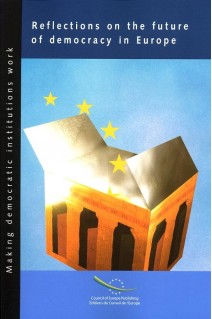In 2004, experts from civil society, governments and academia came together in Barcelona at the Council of Europe's conference on "The future of democracy in Europe" to discuss the challenges and opportunities facing contemporary democratic governments. In spite of the unprecedented and favourable context of democracy in Europe today, states are having increasing difficulty in meeting these challenges through their traditional institutions and arrangements. The objective of the conference, which marked the end of the three-year integrated project "Making democratic institutions work", was to debate proposals for democratic reform.This book contains major contributions to this conference. A broad range of topics was covered, including: more inclusive elections; the financing of political parties; deliberation mechanisms; popular initiatives and referendums; and, in particular, how modern communication technologies can affect the democratic process. The debate identified the types of changes needed to make governments more accountable, to offset political disengagement and to enhance incentives for citizens to participate in decision-making processes.The conference concluded that democratic practice needs to be continually evaluated and renewed to adapt to new contexts. The participants also agreed that the Council of Europe should set up a forum for the future of democracy to promote reforms across Europe. The forum would act as a type of clearing house for exchanging new ideas and practices, and propose potential models that individual member states can adapt for their own use. Reforms should adhere to the core values of the Council of Europe's acquis in this field, but be flexible enough to allow for the considerable institutional variety in the Organisation's member states.










